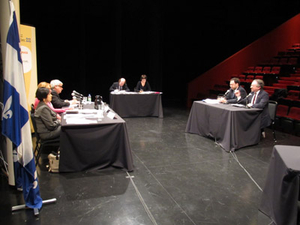We have to give credit where credit is due. When The Suburban’s publisher Michael Sochaczevski and I testified in front of Culture Minister Christine St-Pierre, and her commissioners, hearing testimony on the Payette Report that seeks to institute journalistic accreditation creating two classes of writers, we came with a long list of concerns. Not only those of The Suburban and The Métropolitain but also those of the 31 member Quebec Community Newspaper Association whom we represented.
One of the most important was the Payette recommendation that all accredited journalists do a “formation” in the French language every year. Payette drew no distinction between francophone and non-francophone journalists. This would have posed a threat to all non-francophone media.
 After some heated exchanges, related in The Suburban’s front page story this week, the Minister finally clearly and candidly gave assurance that nothing in Payette relating to language would touch the non-francophone media and that she, and the government, were committed to its growth and viability. And she asked that we disseminate the message. She should be thanked for her forthrightness. This particular issue was also of grave concern to the Quebec Community Groups Network who had written a letter in support of our position which was presented to the Commission. We obtained a vital commitment that protectsl Anglophone and ethnic media on this island which is more than fifty per cent non-francophone. But other issues were presented, noted, but remain unresolved.
After some heated exchanges, related in The Suburban’s front page story this week, the Minister finally clearly and candidly gave assurance that nothing in Payette relating to language would touch the non-francophone media and that she, and the government, were committed to its growth and viability. And she asked that we disseminate the message. She should be thanked for her forthrightness. This particular issue was also of grave concern to the Quebec Community Groups Network who had written a letter in support of our position which was presented to the Commission. We obtained a vital commitment that protectsl Anglophone and ethnic media on this island which is more than fifty per cent non-francophone. But other issues were presented, noted, but remain unresolved.
First among them is the illegitimacy of the state taking any hand in determining who is a journalist. It would put Quebec in the company of Cuba, Zimbabwe, North Korea, India and China. The press, since the French revolution, has been the fourth estate of government. For politicians to allow bureaucrats to determine who is “accredited”, is the same as allowing them to determine who may stand for public office. A free society cannot have two levels of citizenship or two levels of expression.
Secondly, the Payette report is replete with violations of private property. Freedom in a society is grounded in a respect for private property. Payette seeks to dictate to private owners of media everything from how to produce to what to pay to how to hire. If these recommendations are adopted, there will be wholesale closures of media properties.
Thirdly, the report states that there is a “crisis” in media worldwide. It is wrong. There is no crisis. Free expression and the rise of the citizen-journalist as we saw in the Arab spring, is eloquent testament to that. Payette is trying to create a problem where none exists.
Fourthly, the report speaks to the problem of “concentration.” Yet we alone represented some 32 independent media businesses. By introducing state fiat Payette would really see concentration because the independents could not survive under the suffocating demands of the state. More forms. More reports. The Fraser Institute and the Center for Policy Alternatives have already determined that small businesses in Canada spend 19 full working days a year fulfilling government demands. If Payette is enacted, media businesses would easily spend double that. The independents would not be viable.
The bottom line is that radio did not kill newspapers. Television did not kill newspapers. The internet cannot kill papers. We are the content producers. But the Payette report, if substantially adopted, will certainly be the death knell for many. And possibly also for freedom of the press in Quebec. The Payette Report contains a harmful amount of open-ended spending, unnecesaary new programs with unmanageable new bureaucracies that will cost the taxpayer dearly and are totally divorced from the necessities and economic realities of today.
A battle was won but the campaign continues. This story is far from over.

























Commentaires
Veuillez vous connecter pour poster des commentaires.